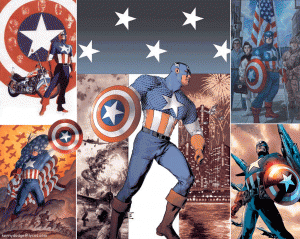From my mid-20s until my early 40s, I walked away from my adolescent comic-book habit. I sold off my original collection (large tears now welling up . . .) and was relatively ignorant of the goings-on in the Marvel Universe. I did pick up the amazing Marvels series by Ed Busiek and Alex Ross in 1994, and that rekindled my love for the “classic” continuity I’d so loved. It also re-connected me with the “Golden Age” heroics of Captain America, Marvel’s WW II icon, whom I’d gotten a taste of back in the 70s through Roy Thomas’ amazing Invaders “retro-continuity” series.
Within a few years I’d jumped back in with both feet, gathering up and reading every comic book appearance of the “Living Legend” I could find (which, thanks to the magic of reprints, I’ve pretty much managed to do). My experience as a Civics teacher resonated with the patriotic metaphors that abound in the Cap mythos, and my interest in Classics helped me begin to understand the Star-Spangled Sentinel in more grandly heroic terms. Captain America, I think, is an American Odysseus. The glory days of WW II are his Illiad, and his life since being “revived” in the 1960s are his Odyssey.
In his introduction to Robert Fagles’ popular translation of Homer’s , Bernard Knox begins, “’Odyssey’ is a familiar English word, meaning, according to Webster, ‘a series of adventurous journeys usually marked by many changes of fortune.’” Of course, the word itself derives from the Greek Odusseia, meaning simply “the story of Odysseus,” the classic tale of the fabled king’s journey home to Ithaca after the Trojan Wars.
While the Odyssey is certainly an “adventurous journey” filled with many “changes of fortune,” Knox reminds us that this classic hero returns “to find at home a situation more dangerous than anything he faced on the plains of Troy or in his wanderings over uncharted seas.” For Odysseus, returning “home” defines him. His country, his family, his values—all have been simultaneously defended and sacrificed during his time at war. The Great Question before him as he returns is, can they be restored? Or have they been lost for all time during his absence? And if lost—what is his place in this place that is no longer “home”?
No modern hero emulates the spirit of the Odyssey as well as Captain America. He is “born” into a world in which the ideal of the American Dream was as formative and motivating for him as ever experienced by noble Greek. His mettle and values–tested in his own Iliad, World War Two–have been sacrificed during his two-decade Great Sleep that followed. Since his revival, his life has certainly been “a series of adventures” marked by “many changes of fortune.” His return has always been shaped by the same central question faced by Odysseus: can his country, his family, his values–which he embodies as surely as did Ithaca’s King—ever be restored? Or have they been lost for all time during his absence and the struggle to find his way home? Perhaps even more powerfully, Steve Rogers has wrestled for four decades with the real possibility that all has been lost, and his story has been much more defined by his efforts to find his place in a world that is no longer “home”.
Steve Rogers/Captain America has been at the center of almost every major development in the Marvel Universe since its inception. He’s survived “death” at least a half-dozen times, always brought back to continue “fighting the good fight.” In the series of posts which will follow this, I’ll comment on some highlights of that start-spangled career. And I’ll try to make the case that it is finally time (more likely way past time) for him to be allowed to find his way home. Although I would dearly miss him, I truly hope Marvel Comics has the courage to let him go.

